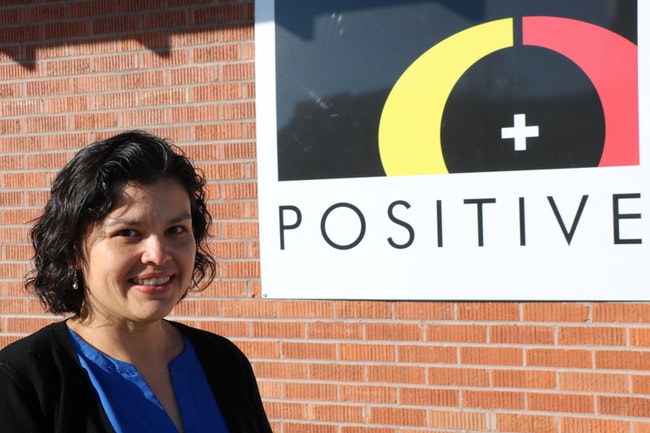
Anabel Ortiz Chavolla, the federal programs director for Ontario School District, said that she “very much agreed” with the Oregon Department of Education’s Education Equity stance, which “means the restructuring and dismantling of systems and institutions that create the dichotomy of beneficiaries and the oppressed and marginalized.” (The Enterprise/Liliana Frankel)
ONTARIO – Helping students pull even with their peers in school has long been a goal of law and education practice, but it remains a political issue as voters in Malheur County pick the next batch of school board members.
“Equity” is considered a buzzword in some circles.
For others, it is a cardinal value.
The state Education Department considers equity a core value.
“The pursuit of equity in education is trying to realize foundational commitments to belonging, the idea of ‘liberty and justice for all’, and making sure the ‘we’ in ‘We the People’ is big and truly does include each and every student and family in the community,” said Peter Rudy, public affairs specialist for the department.
Locally, the importance of equity is sometimes debated, even in contexts where clear disparities between racial and ethnic groups persist.
In Nyssa, Latinx students make up 66% of the student body but their proficiency rate on state scores in math lagged 28% behind their white counterparts in 2018-2019, the most recent year for which scores are available. The gap is consistent for language arts, with Latinx students almost 30% behind their white classmates.
In Ontario, which is 62% Latinx, the gap between white and Latinx scores is less than in Nyssa, but still pronounced. White students were 17% ahead of their Latinx counterparts in math and nearly 15% ahead in language arts.
Equity in education is considered necessary to end those gaps. It would also likely increase representation for the Latinx community on school boards, which are majority-white in both Ontario and Nyssa.
“Every student and the community benefit when we center educational equity. For too long, how much money a person makes, the color of their skin, or gender – as a few examples – can be used as reliable predictors of student outcomes,” said Rudy. “Having equity as a goal means you want to break those patterns and build better ways to teach, learn, and lead.”
The Enterprise asked officials from Ontario and Nyssa districts about the equity debate. School board candidates in those districts also were then questioned about problems with equity they saw as persistent in their districts, and solutions they propose.
“The misinterpretation surrounding equity is that it takes away resources from others,” said Lisa Longoria, principal at Ontario Middle School.
She shared a quote she finds defines the concept: “Equality is leaving the door open for anyone who has the means to approach it. Equity is ensuring there is a pathway to that door for those who need it.”
Some parents “don’t really understand what equity is,” said Nikki Albisu, Ontario superintendent. “They kind of go to that notion of fair versus equal. If we’re helping an underserved student, a minority student, a homeless student, if we’re putting any resources into them, it’s automatically taking away from their student.”
In reality, said Albisu, “it’s not one pot of money that we chop up and only allocate the resources to one (group of students).”
School districts across Malheur County receive special allocations beyond normal funding for students in poverty, homeless students and migrant students.
“We have millions and millions of dollars in additional funding because of those kids,” said Melissa Williams, Ontario’s director of school improvement. “If anything, that funding is kind of overflowing into the general fund and creating more opportunities for middle class kids.”
“Every student is unique and our job is to figure out how we can best ensure access to needed supports,” said Anabel Ortiz Chavolla, director of federal programs at Ontario. “For some students, connecting them to community resources might be enough to improve their situation so they can be present and engaged at school. For other students, it might be that we pay for their college credits while in high school.”
“I think everybody in this area wants every child with unlimited potential to succeed,” said Darren Johnson, Nyssa superintendent. “More than just equity, Nyssa people I talk to have a strong feeling that all kids have limitless potential, and we want to include all kids in the opportunities to succeed.”
In Nyssa, a Spanish and English language immersion program at the elementary school is now in its seventh year. Johnson said that data about how the program has helped advance equity was still forthcoming, but that “I believe that helps all of our kids. I think that also helps the transition for some of our native Spanish speakers.”
Nyssa and Ontario provide children with free breakfast and lunch, and both districts also run summer programs to support their migrant youth, who may have significant gaps in their schooling due to seasonal moves. During the pandemic, both districts also made efforts to connect low-income students with the technology needed to get on the internet, including buying hotspots and paying for service.
In Ontario, board incumbents Blanca Rodriguez and Craig Geddes, both seeking re-election, qualified equity as “a top priority” and “extremely important” respectively. Geddes’s challenger, Martin Mendoza Jr., did not respond to a request for comment, but spoke explicitly about the importance he placed on equity during a recent public forum.
Rodriguez’s challengers, Cydney Cooke and Tony Cade, concurred that equity was “extremely important” and “very important.” Matt Stringer and Tom Greco said that equity was “very important” and “critical.” Stringer’s challenger, Jeff Schauer, has withdrawn from the race. Greco’s challenger, incumbent Derrick Draper, who quit the school board recently but remains on the ballot for re-election, declined comment.
The candidates diverged in their sense of ongoing issues with equity in Ontario.
Some candidates asserted that there weren’t persistent problems.
“I do not believe that equity suffers in Ontario’s school district,” said Stringer.
“Our district has a laser focus on equity and I have not heard any concerns about equity in our schools,” said Geddes.
Others, however, identified various problem areas.
“One of the most significant problems Ontario School District faces is the turnover rate of students who move in and out of the district,” said Cade. “Another is that sometimes the district focuses so much on those who are behind that those at grade level are denied opportunities.”
Cade proposed special training for teachers to aid them in serving transitional students, as well as “searching out grants that offer enrichment for ALL students not just those who are behind.”
Greco cited as a “problem of equity” the “two misperceptions within the community that equity is a zero sum game and that there will be winners and losers in reaching equity.”
“I think the district recognizes that each student has different needs and gifts,” said Greco. “As a board member I would work with the district administrators, teachers, students and our community to continue to find best practices that would better serve all of our students.”
Rodriguez said Ontario’s high poverty rate presents the district with challenges.
“I do believe school teams are working to support students and their families to overcome these challenges,” she said. She proposed the district “continue supporting students and families as they navigate this pandemic. In addition, this board needs to support the successful efforts of the educators.”
Cooke said that the “lack of languages taught in the district leave the youth at a disadvantage.”
“Since Latinx is the majority population, Spanish should be an extracurricular taught for one hour a week to all students,” Cooke said. “Oregon believes that learning more than one language is important and this should be included to the district’s core values. In addition, if this program is successful the board and district could look towards teaching Japanese as well.”
Cooke also cited the importance of teaching STEM subjects like robotics.
“Underprivileged students have a less likelihood of becoming familiar with these new technologies, which puts them at a geographical disadvantage not only to the rest of Silicon Valley, but the country,” she said.
Although Geddes did not highlight specific problems of equity, he said he recognized that “the pandemic has helped us learn that we can reach kids in new ways. I would like to explore the option of an online academy.”
In Nyssa, three out of 12 candidates responded to the survey on equity.
Alesha Munk, who is running against incumbent Kim Stipe and challenger Jason Berry, said that equity is a “vital goal in order to improve the lives of those who are underserved in Oregon’s education system.”
“While understandably resources will need to be allocated to ensure these efforts, I believe that the result of creating a culture of equity will benefit the state in the future as we watch more high schoolers graduate, more adults getting trade skills or college degrees and more eligible workers being employed in the communities around us,” she said. “This, in turn, will create better financial security and more stable homes for the next generation.”
Munk praised Nyssa’s dual language program, as well as its bilingual communications and the effort made to get kids back for in-person instruction. But she said that she saw significant problems with equity persisting in the district, including reaching out to students “who choose to leave school early, without graduating, to help financially support their families.”
“This is a matter of greater proportion than can be solved within the schools alone,” she said.
Still, she said, the district can have an impact.
“Apprenticeships and trade labor certification should be promoted perhaps even stronger than the traditional college route,” she said. “Job fairs, internships, hands-on skill based courses, motivational speakers and ample guidance counselors are needed to ensure that no student ever thinks that they do not have a choice in their future.”
Susan Ramos, running against incumbent Torie Ramirez and challenger Greg Armenta, took a lighter view of equity at Nyssa, which she acknowledged was still an issue, but one the school district was working on.
“We just need to make sure that any parents that have questions about school or how things work feel comfortable and have somebody that can be an advocate for them,” she said.
To improve communication with parents, she suggested “just checking on them more often and seeing what they need, and if they have needs, trying to address it.”
Megan Robbins is running against incumbent Bob Fehlman, the current school board chair. She said that the biggest misunderstanding around equity was confusing it with equality.
“Providing equitable opportunities doesn’t mean that some kids get less – just what they need,” said Robbins. “There are economic disparities amongst the students and misunderstandings about the long-term effects poverty has on opportunities.”
Robbins cited the migrant program and a program at the middle school called Read 180 as particularly strong elements of equity in the district. She also praised the district for getting students online during the pandemic. But, she said, there are still problems to resolve.
“Addressing there is a problem would be the first step for our community and getting the community to buy into the idea that by making things equitable benefits all of us,” she said. “We want our test scores, academic achievements of our students, and long-term successes to reflect the vision we’ve created about our community,” she said.
CORRECTION: Derrick Draper resigned from the Ontario School Board during an executive session but remains on the ballot for re-election to the seat. An earlier version incorrectly stated that he had dropped out of the race. The Enterprise apologizes for the error.
News tip? Contact reporter Liliana Frankel at [email protected] or 267-981-5577.
SAFEGUARD YOUR LOCAL NEWS
Take one action today to help the Enterprise grow and do more for the community through accurate, fair reporting.
SUBSCRIBE: A monthly digital subscription is $5 a month.
GIFT: Give someone you know a subscription.
ONE-TIME PAYMENT: Contribute, knowing your support goes towards more local journalism you can trust.




